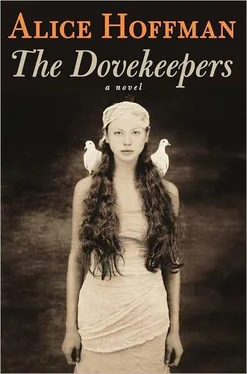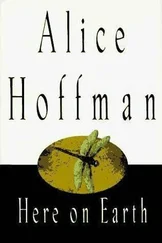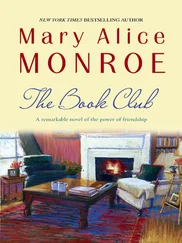Alice Hoffman - The Dovekeepers
Здесь есть возможность читать онлайн «Alice Hoffman - The Dovekeepers» весь текст электронной книги совершенно бесплатно (целиком полную версию без сокращений). В некоторых случаях можно слушать аудио, скачать через торрент в формате fb2 и присутствует краткое содержание. Год выпуска: 2011, ISBN: 2011, Жанр: Историческая проза, на английском языке. Описание произведения, (предисловие) а так же отзывы посетителей доступны на портале библиотеки ЛибКат.
- Название:The Dovekeepers
- Автор:
- Жанр:
- Год:2011
- ISBN:978-1-4516-1749-8
- Рейтинг книги:2.5 / 5. Голосов: 2
-
Избранное:Добавить в избранное
- Отзывы:
-
Ваша оценка:
- 60
- 1
- 2
- 3
- 4
- 5
The Dovekeepers: краткое содержание, описание и аннотация
Предлагаем к чтению аннотацию, описание, краткое содержание или предисловие (зависит от того, что написал сам автор книги «The Dovekeepers»). Если вы не нашли необходимую информацию о книге — напишите в комментариях, мы постараемся отыскать её.
The Dovekeepers — читать онлайн бесплатно полную книгу (весь текст) целиком
Ниже представлен текст книги, разбитый по страницам. Система сохранения места последней прочитанной страницы, позволяет с удобством читать онлайн бесплатно книгу «The Dovekeepers», без необходимости каждый раз заново искать на чём Вы остановились. Поставьте закладку, и сможете в любой момент перейти на страницу, на которой закончили чтение.
Интервал:
Закладка:
The desire for Jerusalem was a fire that could not be quenched. There was a spark inside that holiest of holy places that made people want to possess it, and what men yearn for they often destroy. At night the walls that had been meant to last an eternity groaned and shook. The more the Romans arrested us for crimes against their rule the more we fought among ourselves, unable to decide upon a single course of action. Perhaps because we knew we couldn’t win against their might we turned on each other, riven by petty jealousies, split apart by treachery, our lives a dark tangle of fear.
Victims often attack one another, they become chickens in a pen, bickering, frenzied. We did the same. Not only were our people besieged by the Romans but they were at war with each other. The priests were deferential, siding with Rome, and those who opposed them were said to be robbers and thugs, my father and his friends among them. Taxes were so high the poor could no longer feed their children, while those who allied themselves with Rome had prospered and grown rich. People gave testimony against their own neighbors; they stole from each other and locked their doors to those in need. The more suspicious we were of each other, the more we were defeated, split into feuding mobs when in fact we were one, the sons and daughters of the kingdom of Israel, believers in Adonai .
IN THE MONTHS before the Temple fell, there had been chaos as we labored against our enemies. We made every effort to win this war, but as God created life, so did He create destruction. Now in the furious red month of Av, swollen bodies filled the kidron, the deep ravine that separated the city from the glimmering Mount of Olives. The blood of men and beasts formed dark lakes in our most sacred places. The heat was mysterious and unrelenting, as if the wickedness of earth reflected back to us, a mirror of our sins. Inside the most secret rooms of the Temple, gold melted and pooled; it disappeared, stolen from the most holy of places, never to be seen again.
Not a single breeze stirred. The temperature had risen with the disorder, from the ground up, and the bricks that paved the Roman roads were so hot they burned people’s feet as the desperate searched for safe havens — a stable, an abandoned chamber, even the cool stone space within a baker’s oven. The soldiers of the Tenth Legion, who followed the sign of the boar, planted their banners above the ruins of the Temple with full knowledge this was an affront to us, for it threw in our faces an animal we found impure. The soldiers were like wild boars themselves, reckless, vicious. They were coursing throughout the countryside, killing white cockerels outside synagogues, meeting places which served as bet kenesset and bet tefilliah, houses of both assembly and prayer, as an insult and a curse. The blood of a rooster made our houses of worship unclean. Women scoured the steps with lye soap, wailing as they did so. We were defiled no matter how they might scrub or how much water they might pour onto the stones.
With each violation we understood the legion’s warning: What we do to the rooster, we can do to you.
ONE EVENING a star resembling a sword arose over the city. It could be spied night after night, steadfastly brilliant in the east. People trembled, certain it was an omen, waiting for what was to come. Soon afterward the eastern gate of the Temple opened of its own accord. Crowds gathered, terrified, convinced this occurrence would allow disaster to walk inside. Gates do not open if there is no reason. Swords do not rise in the sky if peace is to come. Our neighbors began to trade any small treasures they had, jostling through the streets, determined to escape with what little they possessed. They gathered their children and began to flee Jerusalem, hoping to reach Babylon or Alexandria, longing for Zion even as they departed.
In the ditches that filled with rainwater during times of sudden flooding, there was soon a river of blood running down from the Temple. The blood cried and wept and cursed, for its victims did not give up their lives easily. The soldiers killed the rebels first, then they murdered haphazardly. Whoever was unfortunate enough to pass by was caught in their net. People were torn from their families, herded off streets. There came the evening known as the Plague upon Innocence. Any illusion that our prayers would be answered vanished. How many among us lost our faith on this night? How many turned away from what our people had always believed? A boy of ten had been taken in irons, then crucified because he had refused to bow down to the soldiers. This boy had been afflicted with deafness and had not even heard the command, but no one cared about such things anymore. A world of hate had settled upon us.
The sin of this boy’s death rose like a cloud, evident to us all. Afterward, twenty thousand people panicked in the streets, trampling each other in a frenzy, forsaking their dignity as they flocked onto the roads.
By the time morning had broken, nearly all had abandoned Jerusalem.
AS FOR ME, my world was over before the Temple began to burn, before stone dust covered the alleyways. Long before the Temple fell, I had lost my faith. I was nothing to my father, abandoned by him from the moment I was born. I would have been neglected completely, but my mother’s family insisted a nursemaid be hired. A young servant girl from Alexandria came to care for me, but when she sang lullabies, my father, the fearsome Yosef bar Elhanan, told her to be quiet. When she fed me, he insisted I had eaten enough.
I was little more than a toddler when my father took me aside to tell me the truth of my birth. I wept to discover the circumstances and took on the burden of my entrance into this life. My name was Yael, and it was the first thing about myself I learned to despise. This had been my mother’s name as well. Every time it was spoken it only served to remind my father that the occasion of my arrival in this world had stolen his wife.
“What does that make you?” he asked bitterly.
I didn’t have an answer, but I saw myself reflected in his eyes. I was a murderer, worthy of his indignation and wrath.
The girl hired to care for me was soon enough sent away, taking with her all consolation and solace. I knew what awaited me upon her departure, the stunted life of a motherless child. I sobbed and held on to her skirts on the day she left us, desperate for her warm embrace. My brother, Amram, told me not to cry; we had each other. The servant girl gave me a pomegranate for luck before she gently unwound her skirts from my grasp. She was young enough to be my sister, but she had been like a mother to me and had given me the only tenderness I’d known.
I gave my gift of the pomegranate to my brother, having already decided to always place him first. But that was not the only reason. I was already full from my portion of sorrow.
AS I GREW, I was quiet and well behaved. I asked for nothing, and that was exactly what I received. If I was clever, I tried not to show it. If I was injured, I kept my wounds to myself. I turned away whenever I saw other girls with their fathers, for mine did not wish to be seen with me. He did not speak to me or take me onto his lap. He cared only for my brother, his love for Amram evident at every turn. At dinner they sat together while I was left in the hall, where I slept. There were scorpions secluded in the corners that soon grew used to me. I watched them, fearing them but also admiring how they lay in wait for their prey on the cool stones without ever revealing themselves. I kept my sense of shame deep inside, much the way the scorpion hid its craving. In that we were alike.
Читать дальшеИнтервал:
Закладка:
Похожие книги на «The Dovekeepers»
Представляем Вашему вниманию похожие книги на «The Dovekeepers» списком для выбора. Мы отобрали схожую по названию и смыслу литературу в надежде предоставить читателям больше вариантов отыскать новые, интересные, ещё непрочитанные произведения.
Обсуждение, отзывы о книге «The Dovekeepers» и просто собственные мнения читателей. Оставьте ваши комментарии, напишите, что Вы думаете о произведении, его смысле или главных героях. Укажите что конкретно понравилось, а что нет, и почему Вы так считаете.












